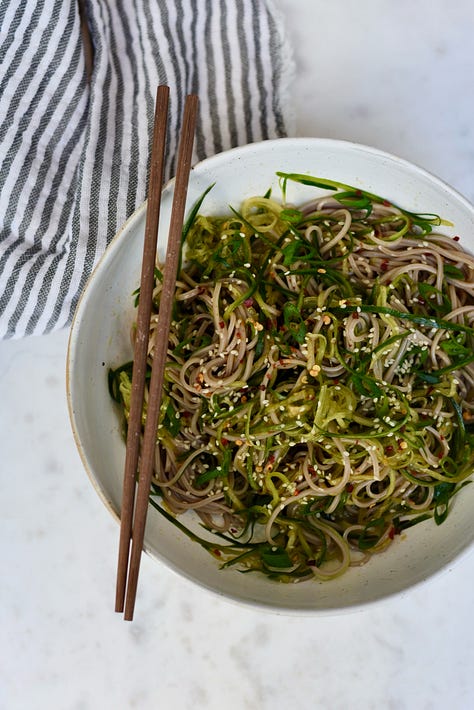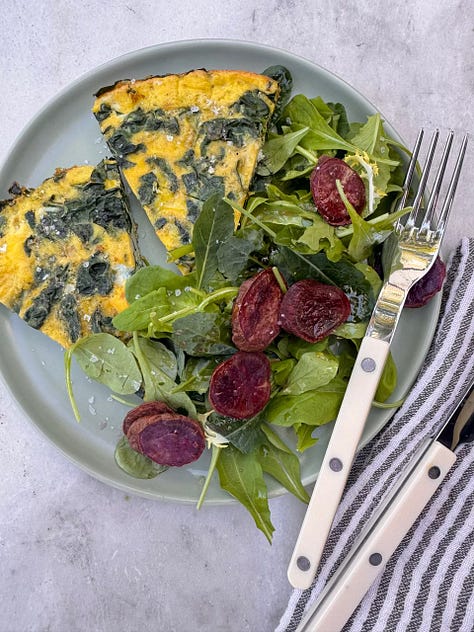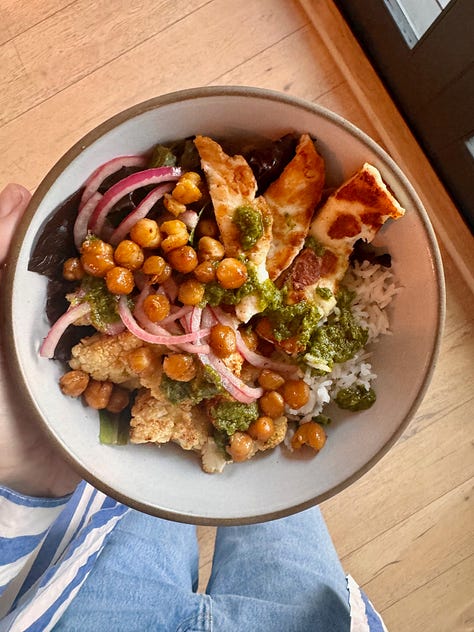Today’s email is all about plant-based protein. This email is free for all subscribers. If you’re new here or want to upgrade your subscription to support this work, here’s how:
Being a health-conscious consumer is pretty rough these days. The messages around how to eat for optimal health are just straight up confusing. Eat more protein, eat less meat? WTF?
Animal protein has been the subject of a lot of criticism over the past few years for both health and environmental reasons. On the health front, Netflix documentaries like Game Changers and You Are What You Eat: A Twin Study (by the same director) convinced many to follow a more plant-based diet but to me felt more like vegan propaganda than anything else. Here is a great article from Dr. Will Cole and a podcast from Dr. Mark Hyman about why the twin study was misleading.
Meat has been labeled unhealthy for many years mainly because of its saturated fat and cholesterol content. However, this has been largely debunked. Read the history of Ancel Keys diet-heart hypothesis if you want to learn more — it’s one of the biggest health scandals in modern history. Now this would make a great documentary (Netflix, are you reading this?)!!
I’m not saying that there aren’t issues here. From an environmental, health, and animal welfare standpoint there are serious problems with factory farming. But plants don’t come without their fair share of drawbacks as well. Pesticides, monoculture, tillage, and other commonly used agricultural practices reduce the health of our soil and the produce that grows from it, pollute our land and water supply, and also contribute to climate change.
Does this mean you shouldn’t eat animals? No. Does this mean you shouldn’t eat plants? No. There are very evangelical voices on both sides of this debate. I fall square in the middle. Plant-based foods are a wonderful source of fiber and micronutrients. Animal-based foods are rich in protein and contain highly bioavailable essential nutrients like b-vitamins, iron, and choline that you can’t get from plants.

In an ideal world, I think we’d all be omnivores eating local, regenerative organic plant and animal-based foods. I know this isn’t possible, and after a decade of nutrition work, I also know that people have legitimate reasons for eating more or less meat—It could be religious, medicinal, or just come down to taste and personal preferences.
And then there’s protein: the hottest nutrition topic of the 21st century. If you’re joining me in our book club next week then you are engrossed in this once overlooked macronutrient. Protein is critical to our current and future health. It helps us build and maintain muscle mass, regulate blood sugar, gives us energy, reduces cravings, creates hormones, impact our mood and mental health, and more more more. I personally eat over 100 grams of protein a day and have my husband eating nearly 200 grams. On top of that, we are both weight training multiple times a week. I want to build healthy muscle mass so I can go to Italy with my grandkids when I’m 85. What I do at 39 lays the groundwork for that. But it’s never too late to start. I even have my parents on this plan, and their results are impressive. My 77 year-old dad says the difference in his mood, energy levels, and back pain is “night and day.” He’s aging backwards!
Interesting side note: At the Olympics in Paris this year, they attempted to serve a largely plant-based diet to the athletes, which was met with extraordinary pushback from athletes who said they could not perform without adequate protein. One Australian swimmer said that the lack of protein served affected her ability to set a world record in the 400m freestyle.
Dr. Gabrielle Lyon makes a claim about Western diet culture in her book Forever Strong (this is the book club book!) that really hit for me. Instead of fixating on fat loss, we should be focused on building and preserving muscle. We’ve gotten the conversation all wrong! Having healthy muscle tissue will impact not just your appearance but every aspect of your physical and mental health. Protein and exercise are the key to this.
So, with all this protein talk, can you get enough protein on a plant-based diet? The answer is yes, but it’s harder. Here are a few challenges with getting adequate protein on a plant-based diet:
There is less protein and more carbs in most plant-based proteins. Animal foods are just a way more efficient protein source. Here are some examples:
You would have to eat 3 cups of quinoa, which has over 100 grams of carbohydrates (net) in order to get the same protein that you would from 3 ounces of chicken (this is half a standard restaurant portion).
You would need to eat 2 cups of chickpeas, which has over 60 grams of carbs to get the same amount of protein you would from 4 ounces of grass-fed beef. If you bought a pound of ground beef, this would be just a quarter of that.
The protein in plant-based foods is less bioavailable (you absorb less). This means you need to eat more food to get an equivalent amount of amino acids. The amino acid leucine, for example, is critical to muscle health and found in lower quantities in plant-based proteins.
Most plant-based proteins are not complete proteins (meaning they do not contain all 9 essential amino acids).
When eaten together, beans and rice can create a complete protein, but one cup of beans and rice has less than 7 grams of protein and over 30 grams of net carbs. To get 30 grams of protein, you would need to eat over 4 cups, which would be the carb equivalent to over 3 bowls of pasta.
When dining out or traveling, it can be difficult to find menu items with adequate plant-based protein. This can lead to overeating carbs, under-eating protein, or (most likely) both.
Meat alternatives, like Beyond Meat, are highly processed, don’t have as much protein as animal sources, and are not good for your health or the environment.






If you’re reading this and follow a plant-based diet, I’m not trying to tell you to eat differently (look at these plant based meals, yum!). The point of this piece is to help you get the protein you need to thrive, which frankly is just a bit harder without animal protein. Here are some tips:
Consider expanding your protein options. Perhaps there are a few animal-based proteins, like fish, dairy, eggs, or a collagen protein powder, that you’d be willing to incorporate into your diet. Incorporating a few of these foods can make a massive difference when trying to hit your daily protein goals without eating meat.
Make a list of meals with 30 grams of protein that you can rotate. Here are a few ideas:
French lentil salad (1 cup of french lentils = 18 grams of protein) with walnuts and goat cheese or an egg
Edamame noodles (1 serving = 24 grams of protein, so have a little extra) with mushroom bolognese
Three eggs with 1 slice Ezekiel bread and a scoop of cottage cheese
Mexican bowl with black beans, rice, and tempeh
Grain bowl with tofu or pomfu, quinoa, and some seeds (pumpkin, hemp, etc.)
Greek yogurt (2 servings) with berries
Cottage cheese (1.5 servings) with tomatoes and Ella’s flats
Find sneaky ways to get more protein in (these options are great for travel too):
Add collagen to your coffee or tea in the morning (I love Needed’s collagen—discount code: MIA20)
Have an afternoon protein shake
Find a protein bar you like
Here are a few sample days of eating. These are vegetarian, not vegan, and all have roughly 100 grams of protein:
SAMPLE DAY 1
Morning: Coffee with collagen (20g)
Breakfast: Greek yogurt with berries, coconut cereal, and basil seeds (25g)
Lunch: French lentils with walnuts and a hard boiled egg (30g)
Snack: Apple with peanut butter (10g)
Dinner: Mexican bowl with black beans, rice, and tempeh (25g)
Total: 110 grams of protein
SAMPLE DAY 2
Breakfast: Protein smoothie (30g)
Lunch: Frittata (3 egg slice) with goat cheese and side salad with pumpkin seeds (30g)
Snack: Cottage cheese with fruit (15g)
Dinner: Edamame noodle stir fry (25g)
Total: 100 grams of protein
SAMPLE DAY 3
Breakfast: High protein, low carb oats with collagen (25g)
Lunch: Quinoa and tofu grain bowl with greek yogurt dressing (30g)
Snack: Gramm’s protein lemonade + a handful of almonds (20g)
Dinner: Halloumi pasta salad from this week’s meal prep (25g)
Total: 100 grams of protein
Hope this helps! If you have questions or thoughts, please spark up a conversation in the comments below.
xx Mia




I would love to hear your opinion on Dr. Esselstyn's and Dr. Greger's (amongst others) research about the benefits of a plant based diet and how even world renowned oncologists are now touting an animal product-free diet as a way to fight and prevent cancer. I'm not vegan, but after hearing what they have to say and watching Eating for Tomorrow I'm leaning that way, but at the same time I'm also more confused than ever about who to trust and believe.
In a world of so much conflicting nutrition advice, it’s refreshing to have my same values and way of eating reflected here. It’s one of the reasons why I enjoy following you so much :) So many cookbooks I look through and think, I would never want to make that, but yours I love!